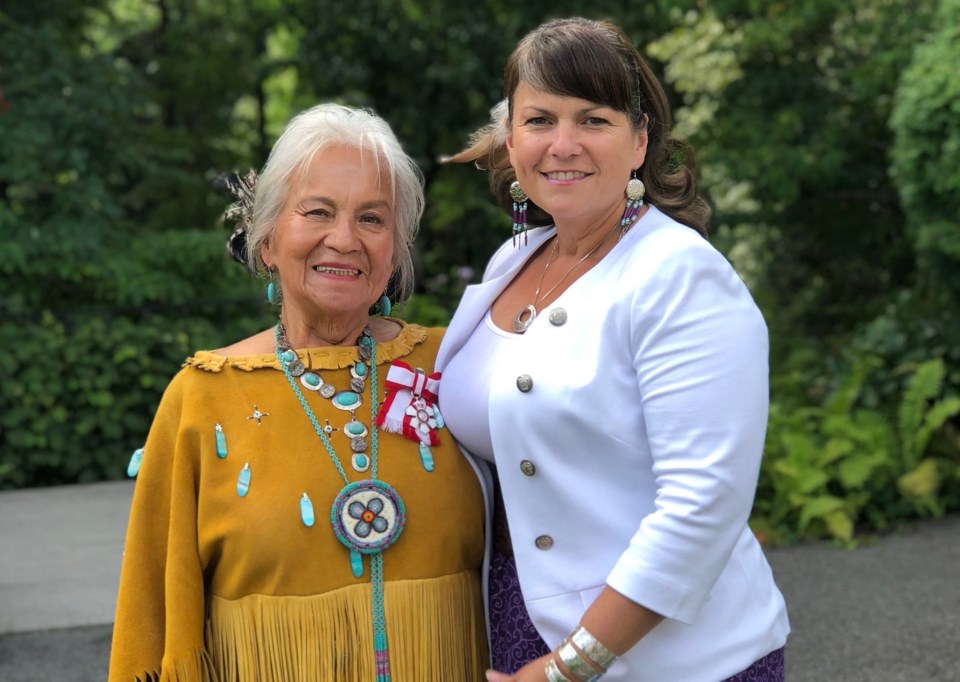The Ontario Native Women’s Association celebrated 50 years as Canada’s oldest and largest Indigenous organization during its 50th Annual General Assembly and Leadership Conference.
“It’s truly an honour to be here, to continue to fight an uphill battle to get Indigenous women recognized, to have their issues in the forefront, and not only just their issues, but, a retelling of our story of leadership that really isn’t told out there,” said executive director Cora McGuire-Cyrette.
“Fifty years of indigenous women not taking no for an answer and continuing to create programming and services that meets their needs and continuing to do the work, without core sustainable funding, and with all the barriers and everything that we face, continuing to be leaders, and I think that’s just one of the greatest stories that we have as an agency.”
During the assembly, ONWA commemorated three generations of Indigenous women in leadership, premiered the ONWA 50th Anniversary Documentary and launched the 50th Anniversary edition of the She Is Wise magazine.
ONWA, Co-founded in 1971 by Jeannette Corbiere-Lavell, works to empower Indigenous women’s lives and address the challenges they face, for themselves, their families and their communities.
Corbiere-Lavell first blazed a trail by speaking her truth through her battle with the Supreme Court of Canada regarding Bill C-31 which changed discriminatory sections of the Indian Act and reinstated Indian Status to women who had lost it through marriage to men without status.
Together, Corbiere-Lavell and ONWA awakened Canada to the challenges and realities of violence experienced by many Indigenous women.
For the last 18 years, Corbiere-Lavell’s daughter Dr. Dawn Lavell-Harvard has championed ONWA as Board President.
“I still remember when I first came in as president, I was still on the youth council, and so, when I walked in the next day after elections, I went in to talk to Josephine Mandamin and I said ‘what do we do?’ and she said ‘well, first thing you do is you put on your good suit, and you go down to Toronto to talk to the Ontario Native Affairs secretariat, and you beg them to let us keep our doors open,” said Lavell-Harvard.
“We were so far in deficit, we were looking at closing our doors, so for me to look from that point of no cash flow, trying to figure out how we’re going to keep our doors open for the women, so they could have services, to serving over 50,000 people and over 30,000 families this past year is just absolutely mind-blowing for me.”
Lavell-Harvard has moved the organization to the point where Indigenous women are reclaiming their voices, traditional decision-making roles in their communities, and legitimacy in their own lives.
As Lavell-Harvard steps down, the ONWA legacy is now being passed on to the next generation, further strengthened by Corbiere-Lavell’s granddaughter Autumn Sky Cooper.
“Carrying the legacy of leadership from my mother, Jeannette Corbiere-Lavell, it has been my mission to support and advocate on behalf of Indigenous women’s rights, always working toward the empowerment of Indigenous women and their families,” said Lavell-Harvard.
“In doing so, I hope that I have honoured her and those who have walked with me and mentored me on this journey.”
ONWA provides access to inclusive, trauma-informed, culturally based programming and services that are informed by Indigenous women and their immediate needs.
This work currently addresses eight areas of focus: MMIWG, child welfare, family violence, sexual violence, justice, health, human trafficking, and housing and homelessness.
“ONWA has listened to Indigenous women for half a century now. We know the priorities and needs of our community, and we continue to lead the way in creating solutions to address them,” said McGuire-Cyrette,
“While our work is far from over, the love, resilience, and strength that Indigenous women hold is creating healing for themselves and their communities.”
For more information on ONWA, visit their website



